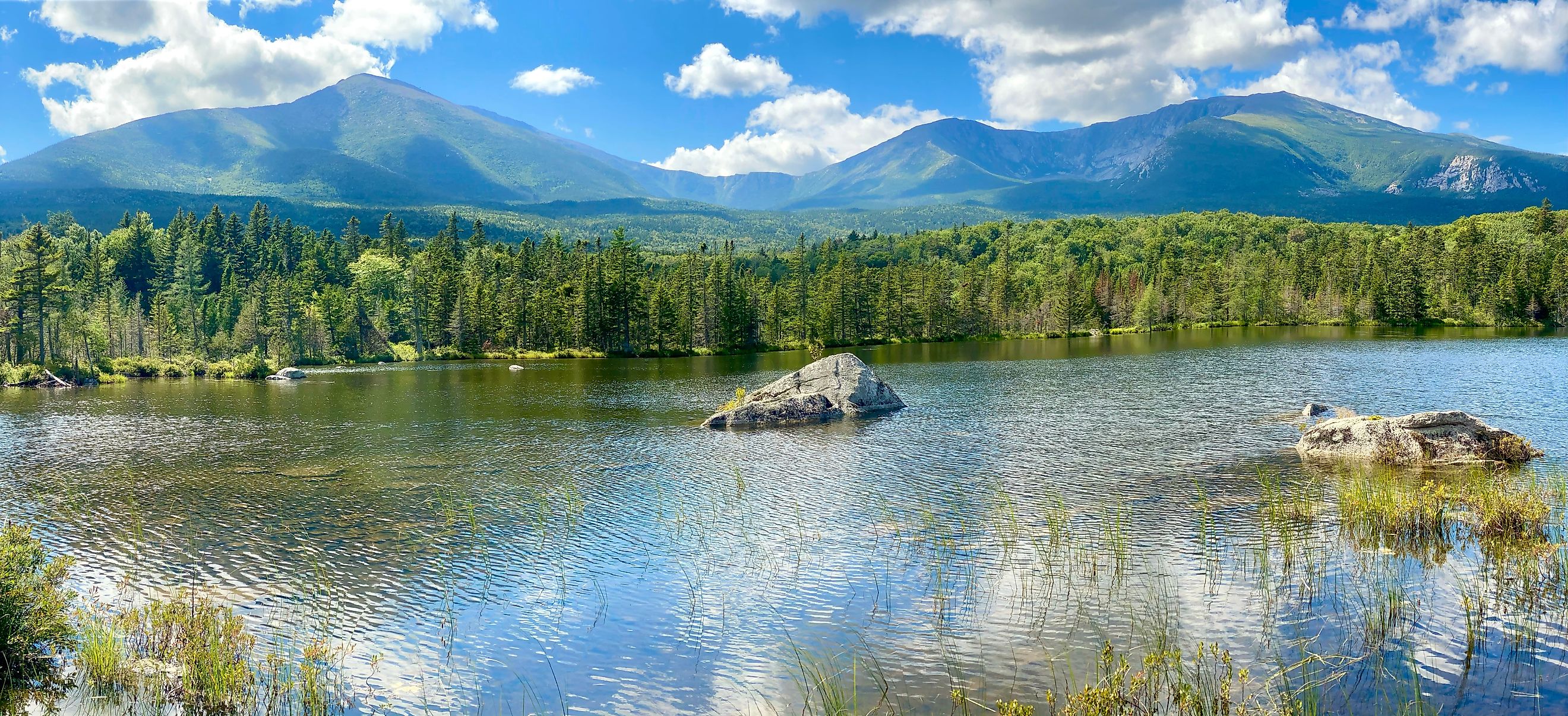
The Natural Wonders of Maine
Maine is a delightful East Coast state that beckons visitors with its awe-inspiring views of the Atlantic Ocean, beaches, vast forests, and mountainous landscapes. Mainly (no pun intended) known for its lobster, lighthouses, and Stephen King, the state also boasts some incredible natural offerings. Whether you are journeying up the coast or exploring the wild and sparsely populated interior areas here, there are sure to be a few notable stops listed here for any road trip within the Pine Tree State. How many of these destinations will you be adding to your list?
Mount Katahdin
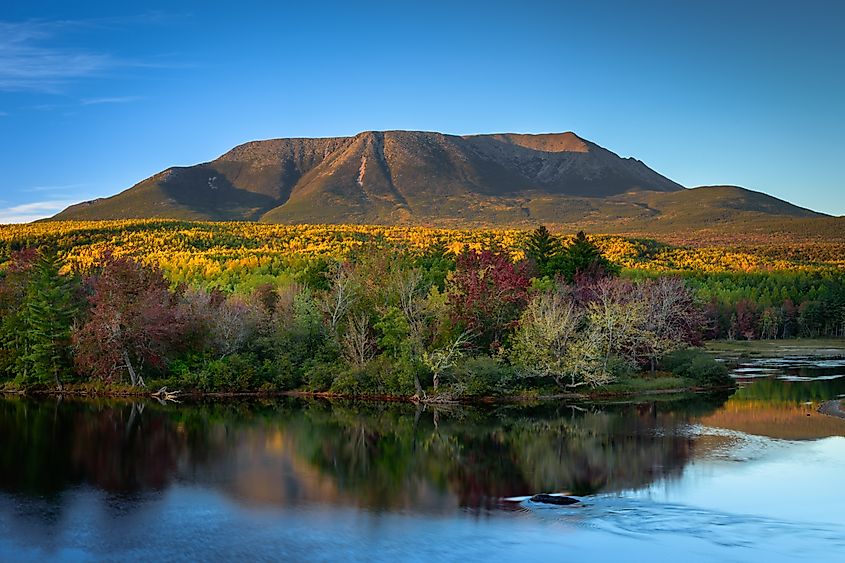
Located in Baxter State Park, Mount Katahdin stands as Maine's highest peak at 5,270 feet (1,610 m). This towering mountain is famous for its rugged beauty and challenging hiking trails, notably being the terminus of the famed Appalachian Trail. Katahdin's distinctive, angular summit will reward all who reach it with sweeping views of the surrounding wilderness, including the expansive forests and numerous lakes of northern Maine.
The Knife Edge Trail, a notable ascent, is known for its exposed, narrow path that requires careful navigation. Its striking landscape, characterized by granite ridges and alpine terrain, makes it a key destination for outdoor enthusiasts and nature lovers alike. Moreover, Mount Katadin's relatively remote location and dramatic scenery contribute to its reputation as a symbol of Maine's wild, untouched beauty.
Penobscot River
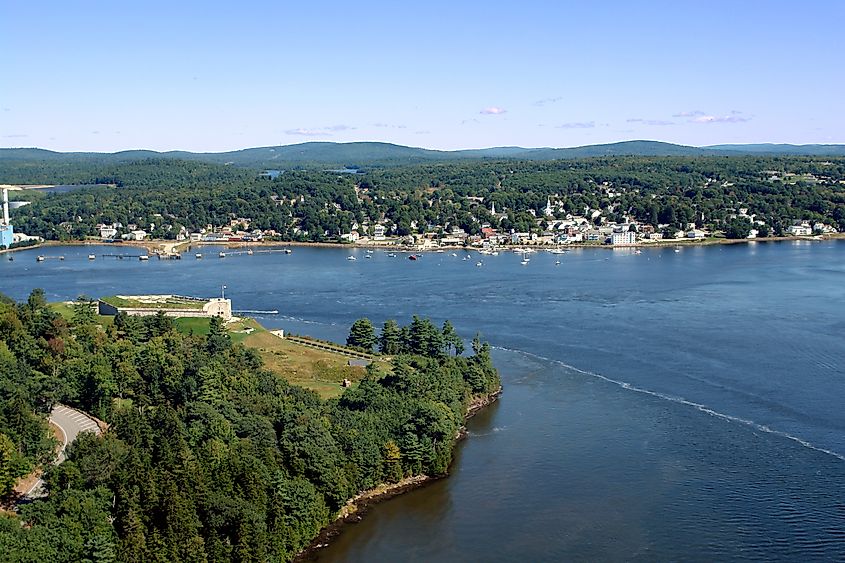
The Penobscot River is the longest river entirely within Maine's borders. It stretches 264 miles (425 km) from its source in the lakes north of Millinocket, past Bangor, and outflows to Penobscot Bay on the Atlantic Ocean. This river, steeped in historical and ecological significance, has been a vital waterway for centuries.
As with many waterways in Maine, the Penobscot is known for its beauty, featuring forested banks, rolling hills, and abundant wildlife, including bald eagles and Atlantic salmon. It has historically been central to the Penobscot Nation and played an important role in Maine's logging industry. Today, the river is a popular destination for outdoor enthusiasts looking to go fishing, kayaking, and white-water rafting, particularly in the Upper West Branch, where the rapids are most intense. Fans of author Henry David Thoreau may recognize this river, as he wrote his work titled "Ktaadn" about his canoe trip up this river on his way to climb Mount Katahdin in 1846.
Acadia National Park
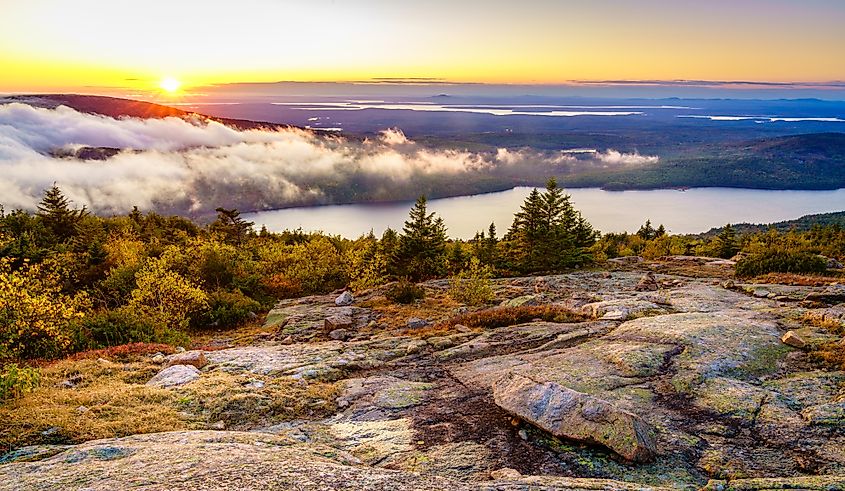
Acadia National Park is situated within Maine's Mount Desert Island and is a wonderful collection of coastal landscapes. Covering around 50,000 acres, the park features granite peaks, windswept coastlines, and clean freshwater lakes. Cadillac Mountain, the highest point along the eastern seaboard, is an incredibly popular destination to catch a stunning sunrise. Don't worry if you can't make it in the morning however, an awe-inspiring panoramic view can be seen here at all times of the day (depending on the day, of course). Visitors should also make a point of exploring the network of trails that can be found here, including the Jordan Pond Path, which circles a picturesque lake with reflections of the Bubbles Mountains.
Acadia National Park's ecosystems range from coastal areas with rocky shores to forests and wetlands. Scenic drives like Park Loop Road provide access to landmarks such as Thunder Hole and Sand Beach. Acadia is also renowned for its rich wildlife, including peregrine falcons and black bears.
Monhegan Island
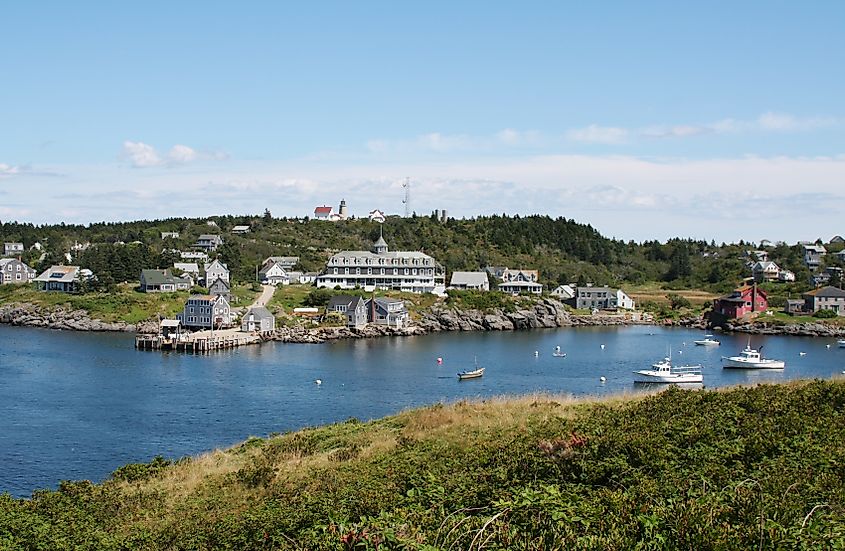
Monhegan Island, nestled in the Gulf of Maine, is a cozy retreat known for its natural sights and its isolation. The island, accessible by boat, is only about 600 acres, has a tiny population of around 60 residents, and offers a unique escape from the mainland with its many lodges, cottages, and other amenities. Monhegan Island's coastline consists of steep cliffs, rocky shores, and sheltered coves. Visitors are free to check out a network of trails here that weave through woodlands and along the coast, leading to unforgettable views of the surrounding Atlantic Ocean and quiet beaches.
Pebble Beach is a popular spot to lounge, while the nearby Cathedral Woods is an untouched piece of forest worth exploring. Monhegan Island is also home to a small, historic lighthouse that is a scenic focal point and navigational aid for the many boats that arrive at its docks. The island’s lack of commercial development ensures a peaceful environment for hiking, boating, and viewing wildlife. There are still some worthwhile shops and restaurants here, like the Monhegan Brewing Company and a grocery store/gift shop.
Orono Bog
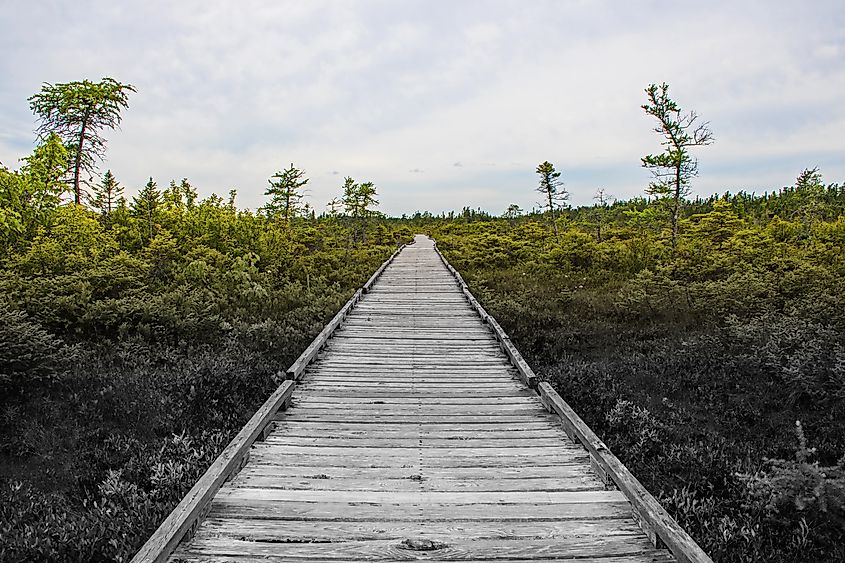
This expansive bog hosts a network of boardwalks and trails that allow visitors to explore its rich plant and animal life up close. Orono Bog, located a short drive just north of the city of Bangor, is home to a variety of grasses, mosses, and other bog plants, which thrive in its acidic, waterlogged soil.
The Orono Bog Boardwalk is a scenic route through the bog’s distinctive landscape, allowing adventurers to explore the ponds and lush vegetation without damaging it. Birdwatchers and other nature enthusiasts also frequent the bog to observe common species, such as the common Yellowthroat and the Canada goose. Its accessible trails and educational signage make Orono Bog a valuable destination for those interested in Maine’s wetland ecology and natural beauty, even though it may not be as extreme as some other entries on this list.
Mount Bigelow
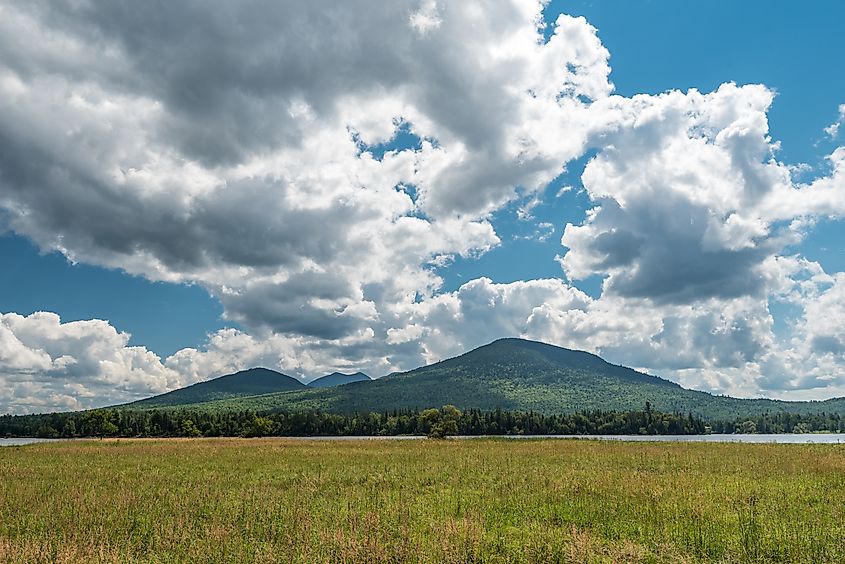
Mount Bigelow, located in Maine's Bigelow Preserve, is a prominent mountain ridge rising to 4,145 ft (1,263 m) in the far western part of the state. This range, part of the more extensive Appalachian Mountain Range, is known for its granite ridges and expansive views from several vantage points along its face. The Bigelow Range features several peaks, with West Peak being the highest and a tremendous challenge for adventurers. It is also one of the best places to see the vistas and lakes in Bigelow Preserve, including the nearby Flagstaff Lake, Mooselookmeguntic Lake, and the other rugged mountains.
The Appalachian Trail traverses the mountain, providing its hikers with challenging ascents but, as mentioned before, rewarding scenery. Mount Bigelow's remote location and natural beauty make it a popular destination for experienced hikers and outdoor enthusiasts, many of whom either camp nearby or stay in the towns of Stratton or Kingsfield.
Gulf Hagas
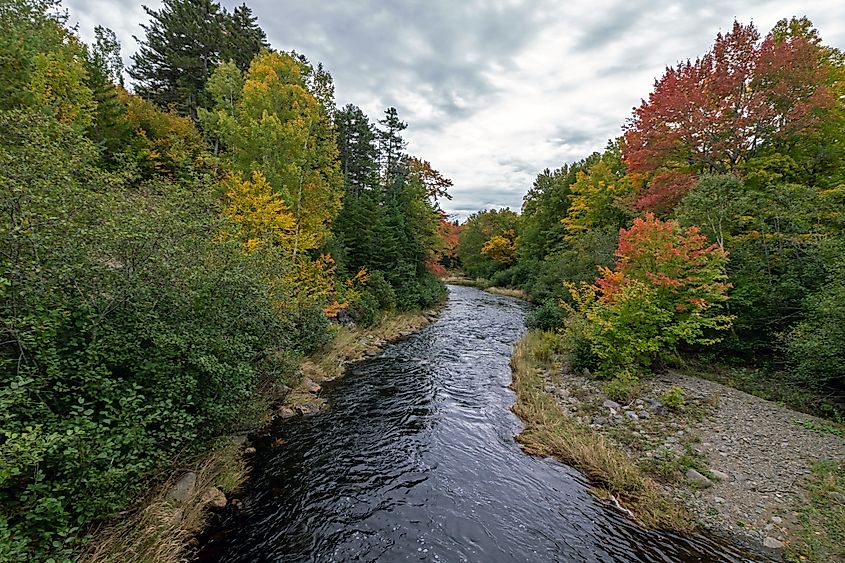
Sometimes called the "Grand Canyon of the East," Gulf Hagas is a stunning gorge located deep in the woods of Northern Maine. This remote natural wonder, carved by the West Branch of the Pleasant River, holds a series of waterfalls, rapids, and deep pools, all enclosed by steep cliffs.
Gulf Hagas goes on for about three miles, giving hikers exploring its rims a challenging adventure along a number of trails in and around the area. The Gulf Hagas Rim Trail, part of the Appalachian Trail, provides you access to breathtaking viewpoints and several notable falls, including Screw Auger Falls and Buttermilk Falls. The gorge’s unique topography includes fascinating rock formations and steep walls that create a sense of seclusion in this already wild and remote region of the state.
Crystal Bog
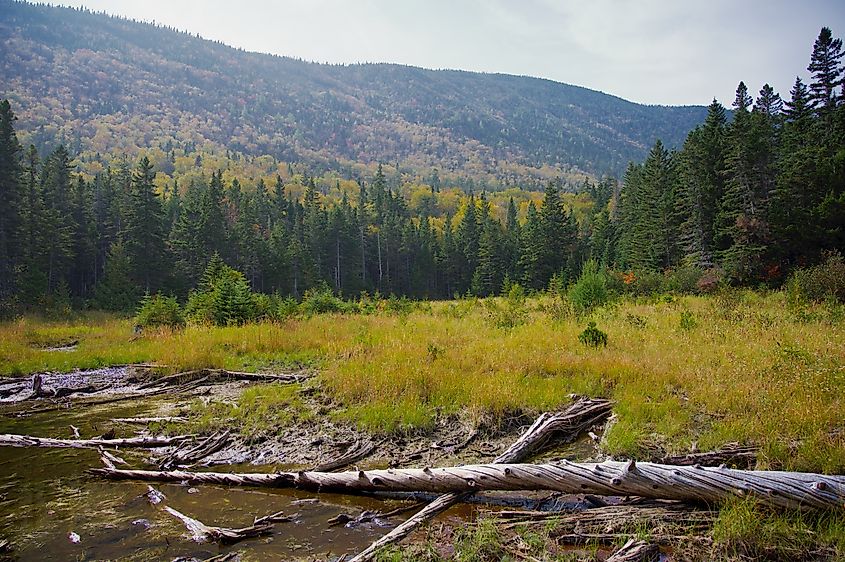
Crystal Bog is a wetland in northern Maine that is considered one of the state's most biodiverse areas. It is home to a large number of fens, rare plants, and animals. This relatively undisturbed bog is characterized by its spongy, peat-filled landscape and diverse plant life, including mosses, sedges, and carnivorous plants like pitcher and sundew. The bog’s acidic, nutrient-poor environment fosters a specialized ecosystem that supports rare and delicate species.
A boardwalk trail system has been built here to allow visitors to travel on the bog and experience it up close without disturbing its fragile surface. Moreover, the area's isolated setting provides a peaceful retreat for nature enthusiasts and researchers alike. Wildlife observers, particularly birdwatchers, frequent Crystal Bog to observe species such as the swamp sparrow and northern harrier.
Debsconeag Ice Caves
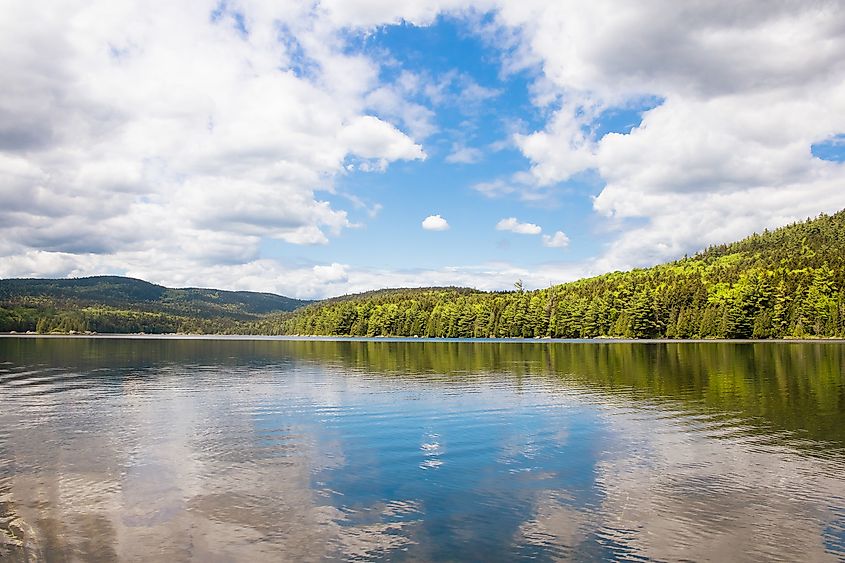
The Debsconeag Ice Caves are a fascinating natural phenomenon that can be explored by those who don't mind frigid and confined spaces. They offer a glimpse into the region’s glacial past and provide a cool, refreshing escape during the warmer months, making them a popular destination for hikers and explorers seeking to experience Maine’s natural wonders. These caves, formed from ancient glacial activity, maintain ice within them well into the summer.
The caves are accessible via the Ice Caves Trail, which winds through the surrounding forests and along the shorelines of nearby lakes. Inside the caves, temperatures remain cool year-round, preserving ice formations. It is also worth seeing the scenic overlook at Debsconeag Ice Caves before or after a trip to the caves. This viewpoint rewards visitors with a view above First Debsconeag Lake, a 1.6-mile-long body of water.
Moosehead Lake
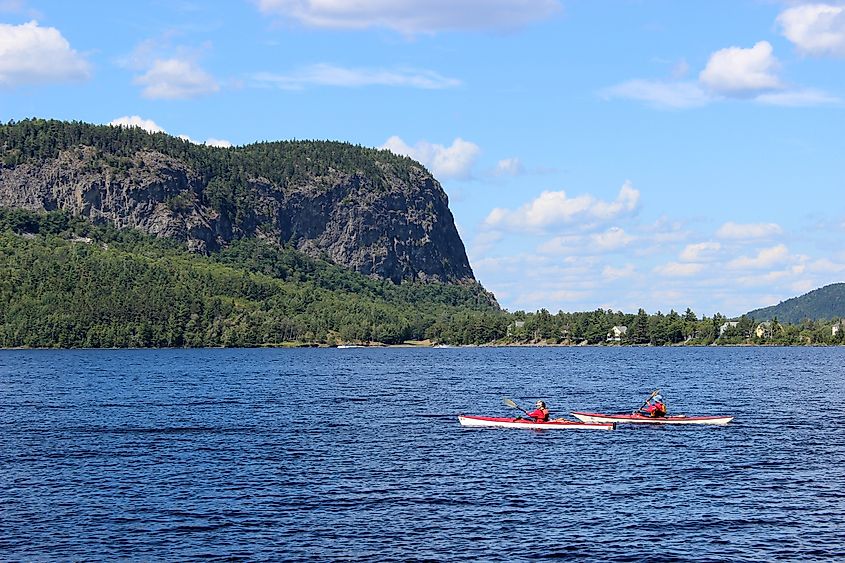
Moosehead Lake, located in the Longfellow Mountains of Maine, is the state’s largest lake, covering nearly 75,500 acres. Its crystal-clear waters and the surrounding dense forests and mountains make this pleasant lake a perfect weekend escape. Visitors take part in various activities at Moosehead Lake, including boating, fishing, and kayaking in the summer, as well as snowmobiling and ice fishing in the winter. Those planning on staying here have many options, whether at one of the numerous resorts and lodges on its shores, in towns like Greenville, or camping at one of the nearby parks.
This lake is also home to numerous islands, with Mount Kineo being the most notable landmark here and its massive, sheer cliffs. In fact, the island is its own state park, aptly titled Mount Kineo State Park.
Quoddy Head
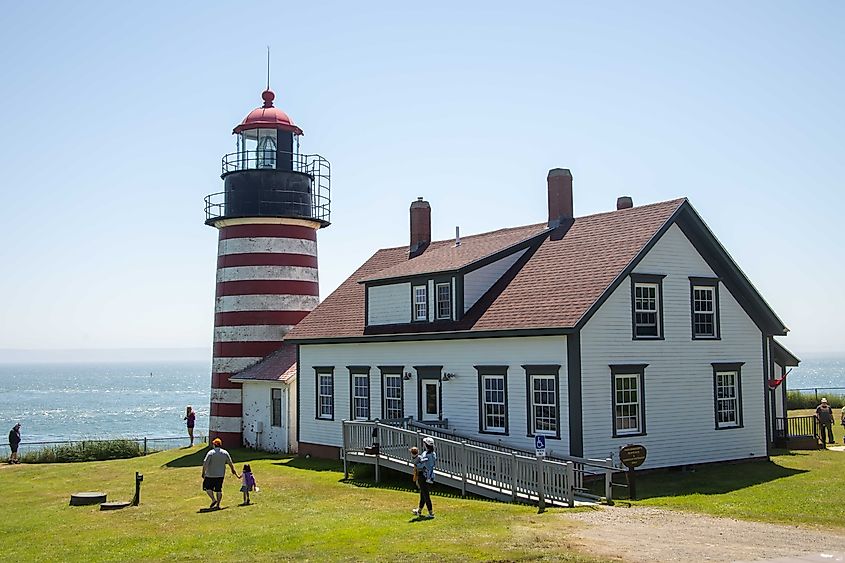
Travel to every corner of the country literally at Quoddy Head State Park, which contains the easternmost point of the continental United States. This park spans over 500 acres and is more than just a significant geographical point; it is also filled with coastal landscapes and lush spruce forests. One of Quoddy Head's most iconic landmarks is the West Quoddy Head Light, a distinctive red-and-white-striped lighthouse that has guided ships since 1808.
The park’s network of hiking trails also provides you access to views of other natural delights, such as the Bay of Fundy. Meanwhile, animal lovers can spot some of the area's wildlife, like seals, bald eagles, and various seabirds. Lubec is on the Canadian border and the biggest nearby town, making it a great place to stay the night during a trip.
Be Amazed By Maine's Many Natural Wonders
Maine's natural wonders, from Mount Katahdin's peaks to Moosehead Lake's expansive waters, showcase the best of this state's offerings. Whether exploring the cliffs of Quoddy Head State Park or the diverse ecosystems of Crystal Bog, each destination mentioned here will give a perfect introduction to Maine's unspoiled beauty. Be sure to fill up on gas and book places to stay well ahead of time, as this sizable state contains few major towns within its northern wildlands, where many of the entries on this list are located.











